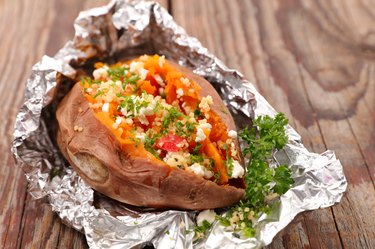
Sweet potatoes are mighty vegetables packed with a lot of nutrition. If that weren't reason enough to eat them, here's one more — a simple baked sweet potato in foil is an easy-to-make single-serving snack or side dish you can pop in the oven to enjoy pretty much any time of day.
Video of the Day
Video of the Day
Snacking on Sweet Potatoes
Sweet potatoes are a powerhouse food because they're rich in complex carbohydrates and lots of nutrients your body needs.
According to the USDA, one medium sweet potato, when cooked without any oil or butter and eaten with the skin on, has only about 130 calories, most of which come from its 30 grams of carbohydrates (with about 5 grams of fiber and 9 grams of sugar) plus about 3 grams of protein. That medium-sized sweet potato will also give you a healthy dose of potassium, vitamin A and vitamin C.
Sweet potatoes taste great when they're prepared to be savory with some olive oil, salt and pepper, or when they're sweetened up with some cinnamon and brown sugar. And if you have a roll of aluminum foil on hand, you have an easy way of cooking just one sweet potato for you to enjoy with minimal prep work or cleanup to go along with it.
Making Sweet Potato Foil Packets
You have a few options when it comes to how you're going to make your baked sweet potato in foil. You could make it in the oven, in the microwave (maybe), on the grill or even over a campfire.
Harvard Health Publishing recommends that the easiest way is to pierce the skin with a fork, put it on a foil-lined baking sheet and pop it in a 400-degree oven for about 45 minutes until it's tender.
But that method can feel a little uninspired. If that's the case, consider making sweet potato foil packets for the oven or grill. They're easier than they look, and they taste delicious.
The National Park Service, which encourages foil packets as an easy camping option, directs you to lay out about 2 feet of aluminum foil and put a portion of whatever you're eating in the center. In the case of sweet potatoes, try cutting them into uniformly sized chunks. Add oil and seasoning. You can also add meat or other vegetables if you want to.
Fold the aluminum foil over so the sweet potato is completely covered, then roll the edges to form a tight seal. If you have a grill fired up, put the foil packet over hot coals and let it cook for 15 to 20 minutes, turning over halfway through.
You can also bake these sweet potato foil packets in the oven, according to USDA Choose My Plate, which recommends preheating the oven to 400 degrees and cooking the baked sweet potato in foil for 20 to 30 minutes. Be careful about opening up the foil packet, as steam will come out.
You can dress up the sweet potato either before or after you've cooked it. Olive oil, garlic, turmeric or Parmesan cheese are great savory options. If you want something sweeter, you can use butter with brown sugar or cinnamon — just be careful about the amount of sugar you add.
Although the American Heart Association says added sugars (brown sugar included) can be used sparingly to improve the taste of foods that provide vital nutrients, there's still a limit to the amount you should use. Adult women should have no more than 6 teaspoons of total added sugar a day and adult men should have no more than 9 teaspoons of total added sugar a day
Finally, if you want to make a baked sweet potato in the microwave, you have that option. Depending on the microwave you are using, however, tin foil might be a bad idea.
The USDA Food Safety and Inspection Service acknowledges that small amounts of foil may be safe in the microwave, but food should not be completely covered by aluminum. If you see sparks, you need to stop the microwave immediately and remove the foil. Instead try making your baked sweet potato in the microwave by wrapping it in a paper towel or setting it in a microwave-safe dish.
Safety of Food and Foil
Some people might have reservations about making a baked sweet potato in foil because they've heard aluminum foil presents health hazards. The methods of making sweet potato foil packets for the oven or grill come from national government agencies, so they should be considered safe — however, here's the information that's out there about foil.
A study published in April 2017 in Environmental Sciences Europe determined that aluminum can be transferred from contact material to food, but it's not clear to what extent aluminum affects body processes.
Similarly, a review published in September 2017 in Deutsches Arzteblatt International concluded that although aluminum exposure should be kept to a minimum, there needs to be more research on its toxicity. The review did emphasize that there's no evidence to suggest a link between aluminum exposure and either breast cancer or Alzheimer's.
- Deutsches Arzteblatt International: “The Health Effects of Aluminum Exposure”
- Environmental Sciences Europe: “Migration of Aluminum From Food Contact Materials to Food”
- USDA Food Safety and Inspection Service: “Microwave Ovens and Food Safety”
- National Park Service: “Meals in Foil”
- USDA Choose My Plate: “Grilled Vegetable Packets”
- Harvard Health Publishing: “Vegetable of the Month: Sweet Potatoes”
- American Heart Association: “Sugar 101”
- USDA FoodData Central: “Sweet Potato”